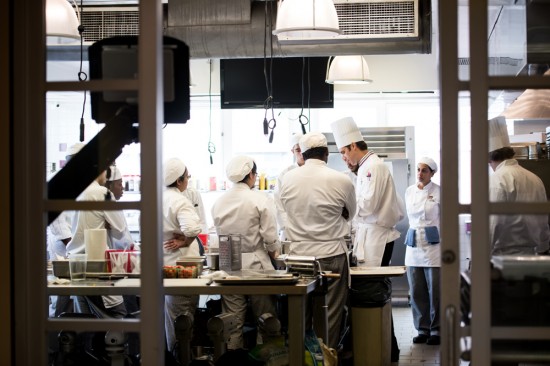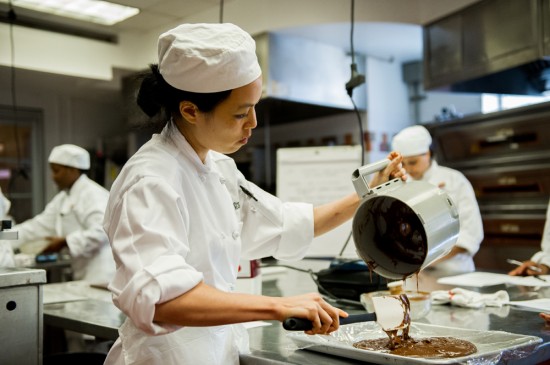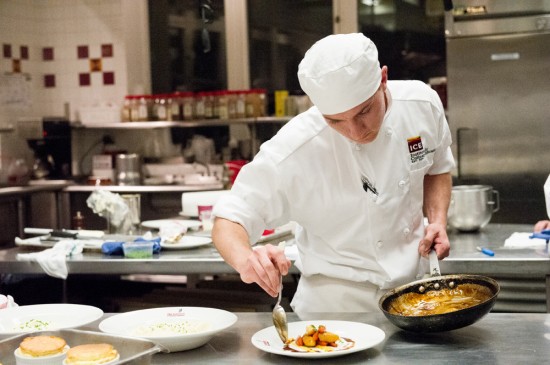With the launch of our brand new location at Brookfield Place, ICE is taking culinary education to the next level. If you’ve been dreaming of launching a fulfilling, creative career in food and hospitality, there’s never been a better time. We know that the choice of “what to do next?” is never easy, whether you’re a recent high school grad or 20 years into your current career. That’s why we’ve developed five key questions that will help you decide whether a future in food is right for you.

Is a career in food right for me?
According to Steve Zagor, ICE’s Dean of Business and Management Studies, “The right time to consider a career in food is when you realize your current life is unfulfilling and you can’t stop thinking about food, restaurants or cooking.” It’s that simple.
“Ask yourself – do I really love the topic of food and drink? And do I love sharing my enthusiasm for that with the rest of the world? Because, if you do, this is a great career for you,” says legendary New York restaurateur Danny Meyer. “Restaurants are about soul, and it’s about learning and it’s about time. You’ve got to really say to yourself: I’m competitive, I want to be the best and I’ve got stamina.”
What if I don’t want to be a restaurant chef?
The truth is that the food industry—including and beyond restaurants—has never been more vibrant, exciting and full of opportunity. From food media to sustainability, product development to start-ups, there have never been more diverse career options for graduates of culinary and hospitality programs.
“There are too many opportunities to name!” adds ICE’s Director of Career Services, Maureen Drum. “Beyond restaurant chef positions, there are career paths in catering, hotels, corporate/educational/healthcare foodservice, gourmet/specialty markets, personal/private chef positions, research and development work, specialty pastry, food media and marketing, culinary instructor—even food trucks!

Should I go back to school or simply “work my way up” in the industry?
“You can work your way up through the ranks, but—for most of us—that will prove to be a slower path,” says ICE’s Director of Education, Andrea Tutunjian. “An ICE education opens doors that otherwise would have been closed or unknown to you. It can provide an edge over others working in the field, and may allow you to move up through the ranks more quickly—allowing you to earn more money in the long run.”
Acclaimed cookbook author Dorie Greenspan—who didn’t go to culinary school—would also attest that culinary school gives you one priceless ingredient for success: confidence. At a panel for female food professionals at ICE, Greenspan attested that while she has enjoyed great success, she would have felt more comfortable saying yes to more ambitious projects if she had the benefit of professional training.

Can I support myself by working in the food industry?
Like any career path, if you’re just starting out, it’s unlikely that your first salary will be in the six figures. That said, if you’ve already earned a college degree or have significant professional experience, the skills and insight you learned in your previous life will be taken into account in the restaurant world.
“Decision making, working with people, seeing the big and small pictures—all these life experiences combine with your newly learned food knowledge. The result can be a smoother pathway to a fulfilling role in an established business as a creative leader or you can set out as an entrepreneur and develop your own business,” says Zagor.
Yet even if you don’t already have an advanced degree or prior professional experience, the skills you learn in culinary school will help you advance through the industry more quickly—earning you a better paycheck and providing new opportunities faster than if you had skipped a formal education.
What's more, the food industry is in the midst of a period of exponential growth, with an outstanding number of new restaurants, food start-ups and service establishments. "Across the nation, top chefs and restaurateurs remark that there is a shortage of talent and a great need for trained professionals," says ICE President Rick Smilow.
How do I know which professional training program is right for me?
Visit ICE.edu to learn more about our four career training programs in Culinary Arts, Pastry & Baking Arts, Culinary Management and Hospitality Management. Then join us for a personal tour of ICE, where you can get your individual questions answered about career opportunities, financing and more.
For more information about culinary careers, attend our free panel with industry experts—Find Your Culinary Voice (and Career!)—on January 13th.




